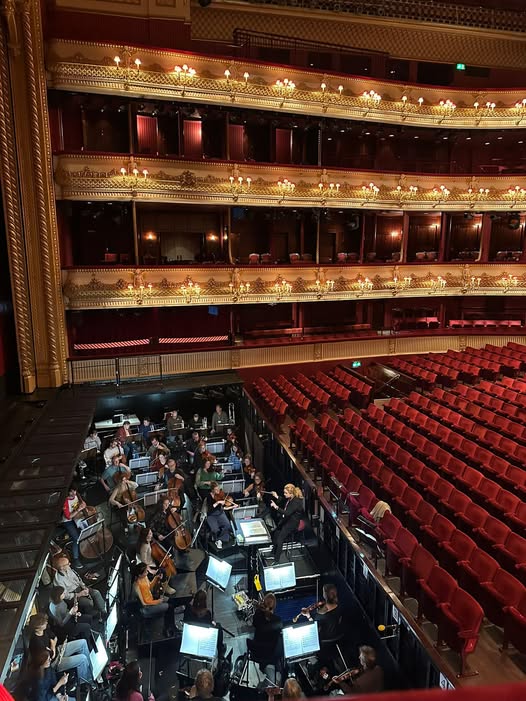The Met Opera is slowly bleeding out
mainDespite two recent box-office successes in Porgy and Bess and Akhnaten, the Met’s finances are looking grim again, reports Michael Cooper in the NY Times.
The Met recorded a $1.9 million deficit in 2018, and the company said it expected it to report a $1.1 million deficit on a budget of $312 million in the 2019 fiscal year, which ended July 31.
Both shortfalls are smaller than in recent years but the company’s credit rating is being revised downward.
Read all the red ink here.






“the company’s credit rating is being revised downward”
No it isn’t. The rating has been confirmed. Only the outlook has been changed from stable to negative.
Also, just to add, an S&P rating of A is far from grim, it’s actually very strong. There are a lot of blue-chip companies with weaker ratings than that.
Regardless, an “A” rating with a negative outlook on a triple-A scale is not exactly gold-plated. Also, I’m not sure where S&P gets the idea that the Met’s Live in HD program has “significantly expanded its revenue base and audience.” Technically, yes – people in the New York area who can’t get to Lincoln Center and people elsewhere who can’t get to New York have the opportunity to pay 25 bucks or so to take in a show. But the clear connotation of “expanding the audience” is one of demographics. That sure isn’t what I’ve seen in the movie theaters (in the suburbs of Washington, D.C.). The only exception is when a Broadway star, Kelli O’Hara, has headed uptown to sing at the Met.
My fear is that the Met will take the report and its warnings to do exactly the wrong thing, which ironically parallels the mistakes of many smaller classical presenters in America. It’s starting to become better known that there is a PROCESS to moving new opera-goers and concert-goers from patrons to donors to potential Mr. & Mrs. Moneybags for the endowment. But that process requires a discipline to know that the last thing you want to do when somebody new comes into your opera house or concert hall is to start badgering them for donations or to just add them to the generic mailing list for lectures about what ticket prices do and don’t cover.
The overwhelming key to forming a long-term patron-donor relationship is not whether somebody new comes to see an opera but whether they come back to see another one, and a third one after that. At least in recent years, the Met interferes with this process by telemarketing people right out of the gate for philanthropic support. I’ve had musical theater friends who’ve taken the suggestion to skip another Broadway show just one evening and try an opera instead – a particular interest of mine, as you may be able to tell – and they’ve been offended by these pitches and vowed never to go back to the Met. There has to be a better way.
If those friends won’t go to the Met, take them to BAM. Especially when Les Arts Florissants is there.
Time for the board to double down and extend Gelb’s contract.
Another 5 years should be enough to put the Met out of business and out of the way so Lincoln Center can get “Cirque du Soleil and Frozen at the Met” up and running.
a 3 percent deficit is completely sustainable for an organization such as the Met. People love to trash Gelb, fair enough, but don’t conflate such a number with financial ruin. Whether or not they can continue the number of productions they run with a house of that size is really the question. They have lots of deep-pocket donors who have and will write off the small amount of deficit. Perhaps the real headline here is two relatively contemporary operas a big box office.
That’s a 0.3% deficit. As you say, small in % terms for the Met, but still a lot of money for most organisations.
FIRE GELB=SAVE THE MET!!!!!!!!!!!!!!
Here’s the rub: who fires the board after it fires Gelb?
A 0.3% deficit is like a mosquito bite and indefinitely sustainable.
Heck, American charity watchdogs heavily penalize nonprofits that run a surplus; running a minor deficit actually makes them look good.
The most alarming aspect of their finances is how small their endowment is: $284 million. The common thinking is that it should be 2x to 5x an organization’s operating budget. If the endowment was where it should be — around $1 billion — they could use a portion of the annual earnings to cover operating expenses.
Yep – the Boston Symphony’s endowment is 2x the MET’s, Juilliard’s almost 4x.
Gelb is a disaster . He should have been replaced years ago. New lobby ? Backstage needs every kind of upgrade and improvement. The crew are the best in the world literally making magic out of Gelbs disastrous production choices/ brutal set changeovers / mouldy sets that have been on tour and warehoused/ and an air purifying water spritz system that used to keep the air fresh and moist for the artists hasn’t worked in years. Gelb refuses to repair and maintain it . He would rather spend hundreds of thousands of precious donors dollars having Proskauer Rose law firm in the opera house on retainer, to attend to any little grievance, than actually deal with employees himself ; oh because he doesn’t know how and isn’t interested in learning . The rank and file are way beneath the “trust fund boys“ curiosity.
He loves his huge salary ; he can do what he really wants to do ; make films no one wants to see.
When will someone on this blog tell someone on the board to get a clue ? They are responsible for the demise of this jewel .
By that standard of a deficit, 99% of arts organizations are “slowly bleeding out.” Heck, by that standard, most giant internet public companies, from google to facebook, are hemorrhaging.
Yeah, a deficit isn’t great, but a deficit of 1,1 million on a budget of 312 million is equivalent to 0,35% of the budget. Not exactly a massive sinkhole either.
But then, it’s fun to proclaim the demise of the Met, isn’t it?
AND….. the latest deficit is ~$800,000 smaller than the previous year’s.
Let’s not pass up an opportunity to engage in the phenomenon I call “Breaking Bad on Peter Gelb”. Ever since it was *announced* that he’d be taking over the MET, he’s been getting hammered by the press for deficits, too many new productions, not enough new productions, lowering standards, spending too much to (in theory) raise standards, etc.
In his last few seasons, Joseph Volpe had to defend himself against complaints about declining ticket sales, too many empty seats in the house, etc. , too.
The reality is opera’s a big, expensive undertaking, and a deficit of slightly over $1 million doesn’t seem like the end of the world to me.
I think that some of the comments here misunderstand the role of a credit rating agency and what they are reporting qualitatively as well. If it were just a question of taking a snapshot of a balance sheet or any given period’s income statement, I imagine that a computer algorithm would take care of assigning a rating and outlook and we’d be done with it. What S&P appears to be raising concerns about is a certain growing misalignment between the Metropolitan Opera’s resources and its capital spending needs in the near future. In addition there’s a sustainability issue being raised in the otherwise counterintuitive complaint of “reliance on large contributions” and the fundamentals of (only) 30% revenue from ticket sales and 10% from media, and what that implies for both the future revenue mix AND future total revenue overall, as I was suggesting in my original comment above. Exactly what is the latest operating deficit is not the core matter in all of this.
I haven’t read the S&P report and I’m just going by Michael Cooper’s story in the New York Times, but I have found him to be a very good reporter on classical music matters in the past. I do understand that to some extent people are reacting to the wording of the headline and item here at SD, but what else is new. Finally it’s great and encouraging that there are certain sold-out performances and runs, but I’m sure it’s the pattern and frequency of these events that’s being looked at. I hope this helps.
Covering 40 percent through ticket sales: is this really a problem? Or is this more-or-less what we would expect for an opera company?
The Met is not just some opera company, and it has particular needs in the near future. Also, there’s both social and financial leverage gained from having that total “ticket” number be even 43% or 44% rather than 40%. There’s plenty of philanthropy dollars out there, but all performing arts groups need to be aware that there’s a rotation of wealth to different industries that tend not to even view the performing arts as virtuous targets compared to healthcare, environmental and other issues. To steal an example I’ve used in other contexts, getting somebody into the opera house 3 or 4 times (NOT once or twice) who may just happen to be the old college roommate of some new tech mogul in not just Silicon Valley but several other places in the US (Boston, Washington, Austin, etc.) could pay enormous dividends down the road.
I really encourage people to read the Michael Cooper story in the New York Times that’s linked. That’s what I’m reacting to, not just what happens to appear in the SD blurb, although I certainly thank SD for calling my attention to it.
I couldn’t agree with you more. Two contract negotiations ago the Met paid me over $2 million dollars for 3 months work to help negotiate their upcoming contract. If I didn’t take over the negotiations from Peter the Met would have had a huge labor dispute.
And the MET board in their feckless wisdom just signed Gelb until 2027. He’s not a fund raiser, the employees literally hate him and the singers have no respect. It is no wonder their finances are not in order. If they had a little better year, look to the obituaries, they had some final bequests which raised their profile promised long before Gelb got there.
Business as usual? The Met will be in contract negotiations with one of the biggest unions that ends in August 2020. They always cry wolf so they can take advantage of the hardest working crew in the world. I bet they ask for a 10% pay cut. After the contract is signed it will be business as usual.
Don’t worry PJ Volpe. I will be replacing you as the new Head Electrician at the Met as soon as the new contract is signed. I spoke to Peter and told him that I really run the Electric department not you and that I could do the job with less people. Let’s be honest we all know that you don’t know the first thing about being a stage electrician. You got away with this for years now by surrounding yourself with people like myself to hide your incompetence. If it wasn’t for your father Joe you wouldn’t have this $475,000 dollar job. Its time to move on. Your family has made enough money from the Met over the years.
I heard Peter talking about papering the House again like he did a few years ago. This gives the impression of a sold out performance every night.
Gentlemen can you please stop voicing your opinions on this website. You do realize that this information that you are spewing is available world wide and people that we work with are reading this. We are all very good at pulling the wool over Peters eyes. Remember this famous quote by one of our former employees of the carpenter department. ( The Met has more actors behind the curtain than in front of it ) Please STOP it so we can all keep our $500,000 a year acting jobs. It would be horrible if we all had to wait tables.
John it appears that you’ve lost total control of your department. What’s going on is a direct reflection of your inability to manage your staff. I guess that I made the right decision to leave the Met and takeover as Technical Director of the Glyndebourne Opera UK. What happened to Paul Masck? I hope that he wasn’t cannon fodder for the so called budget cuts. GET YOUR ACT TOGETHER MAN.
I dont trust met opera company anymore…